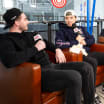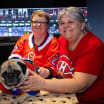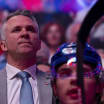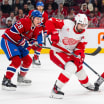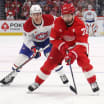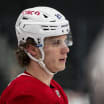Podcast highlights: Stéfano Lanni
The Rocket's strength and conditioning coordinator was a guest of Marc Dumont on the "L'histoire s'écrit" podcast
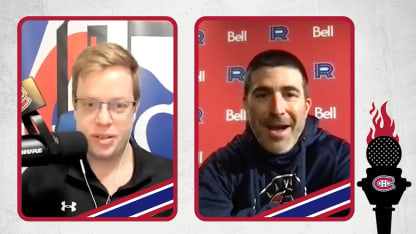
SHOP: UA Women's Locker Long Sleeve
Marc Dumont chatted with Stéfano Lanni, the Rocket's strength and conditioning coordinator, to learn more about his work, his relationship with the players, and how he keeps them in shape. Lanni also shared his thoughts on prospects Ryan Poehling, Lukas Vejdemo and Jan Mysak during the conversation as well.
Read on for a few highlights from Lanni's discussion with Dumont, which is available in its entirety wherever you get your podcasts.
MARC DUMONT:What's your role with the team?
STÉFANO LANNI:I'm in my third year with the Rocket organization. My role is pretty simple. During rookie camp and training camp, I help support Patrick Delisle-Houde and Pierre Allard with the Canadiens. Once camp is over, I head to Laval and start my work with the Rocket. I make sure that the players can perform to their potential. I'm focused on improving their individual situations so they can succeed in a team environment.
MD:What does a typical day look like?
SL:There are some key differences between a practice day and a game day. On a regular practice day, trainers typically get up early and we're usually the first ones to arrive at the rink with the athletic therapists and equipment managers. I'd say we're there around 7:00 a.m. I work out for about 45 minutes, so I'm ready go for 8:00 a.m. The first injured guys will arrive around 8:00 a.m. to visit the clinic with our athletic therapists. About 40 minutes later, they arrive in the gym. That's when everything really gets going for me. I'll do a more specific training session with them because they have certain injury-related restrictions. Around 9:30 a.m., the first active players will start arriving. They'll do some activation work, and we'll work out until 10:45 a.m. While the team is on the ice, I'll have another wave of injured players come in and train so they can get back into the lineup as quickly as possible. Now, we have a second group that's part of the taxi squad. These players need to have the same coaching and training as the rest of the team because they're going to be needed at some point during the season. The schedule is so condensed this year. It's my job to ensure that these players can help us the moment they're in the lineup. They have to help us just like any other player who's a regular.
MD:The mental aspect of the game has always been important. There's a correlation between physical health and mental health. Talk about that relationship.
SL:They're definitely related, even more so in a year like this. It's tough for us and the players. To be a good trainer at this level, you have to understand hockey culture. What if I have a big training session planned with a player who's coming off a horrible game and he hasn't been performing well for two weeks? There's a good chance that the session will be a lot less intense than expected, but I'll make sure to have a good discussion with him. It's necessary. We need to have confidence in each other. I think it's very important to understand what players are going through. I'll earn a lot more of the athlete's respect that way and that will allow me to better understand why he isn't really into the workout on a given day. This job isn't just about following instructions in a book and applying techniques. I have my own role. I'm not a coach and I'm not player. I'm somewhere in between. I can afford to do things that coaches and players can't afford to do with respect to information collection. You always have to be aware of what's happening.
MD:Which Rocket player is a training maniac?
SL:I'd say Lukas Vejdemo. If you watch Lukas, he's one of the best skaters on the team. He's so fluid and fast. He's a real athlete. Lukas played a lot of sports. Europeans usually played a lot of different sports when they were kids. The majority of the time, they're more complete athletes and they're curious about training. Every day, Lukas comes by to ask me what he can do. Jan Mysak also has a great work ethic and he's very dedicated to the game too. He loves hockey. He loves being at the rink. He always has a smile on his face. It's impossible not to love this guy. He's very curious and he always wants to learn.
Watch: Youtube Video
MD:Did you have a chance to work with Cole Caufield? Following his mandatory quarantine, what's the process to ensure that he's ready to make his pro debut?
SL:I met Cole during his draft year. He spent the week at Canadiens camp. We already had that first contact. Cole already knows the coaching staff and training staff here, so he'll feel right at home. Every time a player is in quarantine, we send over some equipment, like a stationary bike, weights and some bands. Patrick has also been working with an app for the last two or three years. The Canadiens were ready for this. The players can follow their programs on their phones. When Cole got to Montreal, he already had a stationary bike, weights and a program waiting for him. Using the platform, I can see if Cole did his workouts and see how everything went. There's a questionnaire at the end to find out his level of intensity. Players aren't alone in this.
Click here to find the show on your favorite podcast app.


